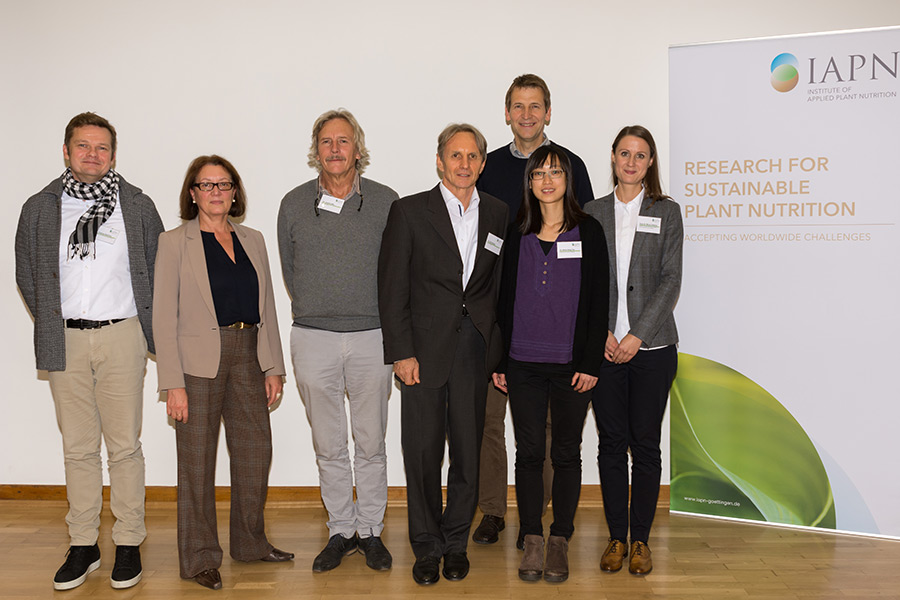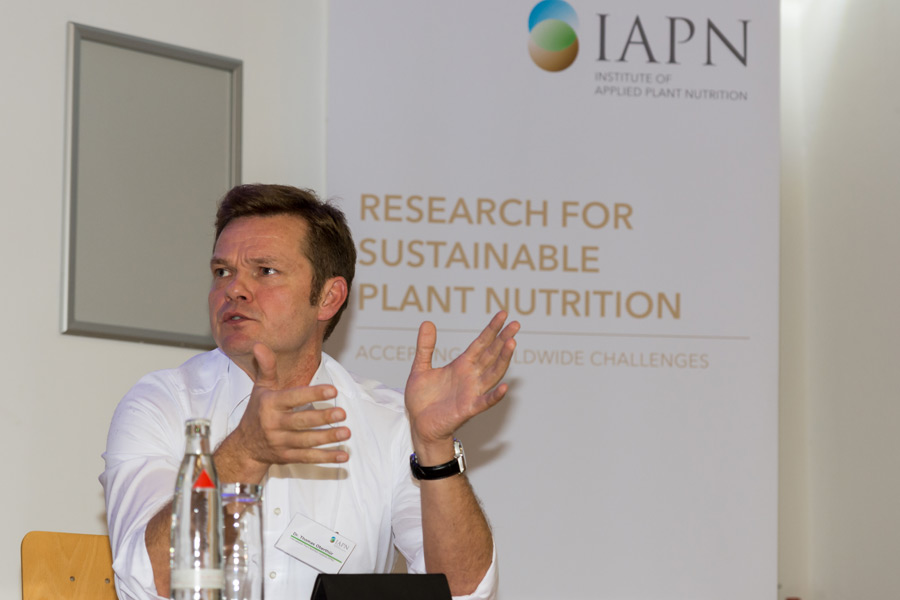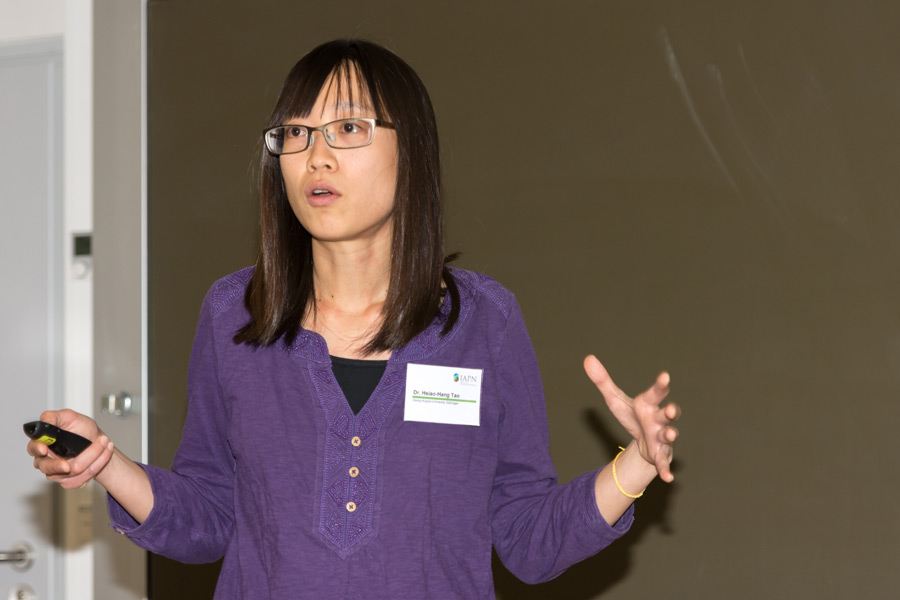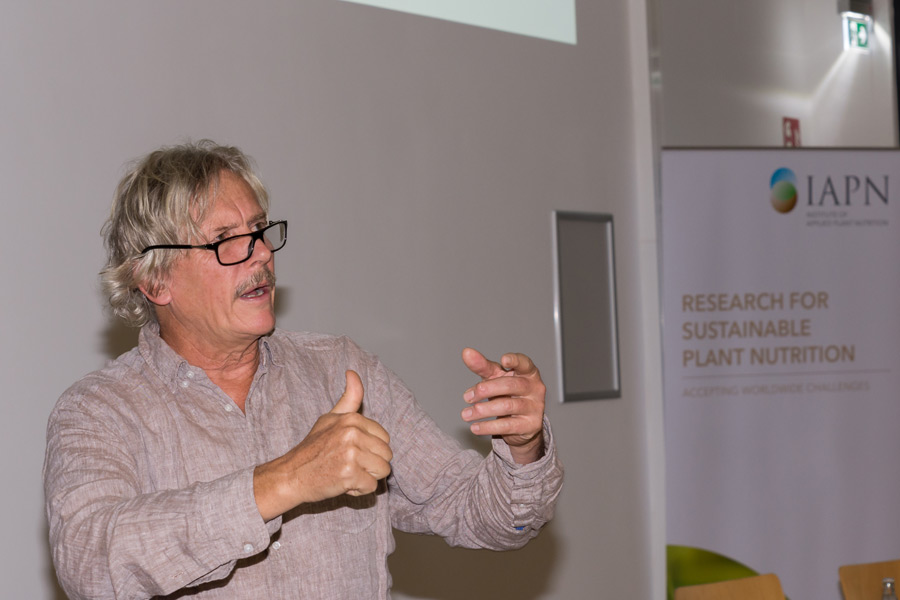In dialogue (left to right): Dr. Thomas Oberthür, Dr. Beate Deuker, Dr. Joachim Milz, Dr. Rolf Härdter, Prof. Dr. Klaus Dittert, Dr. Hsiao-Hang Tao and Prof. Dr. Merle Tränkner. (Photo: IAPN)
Palm oil is part of our daily lives. Within the series "IAPN in Dialogue" was discussed how a sustainable cultivation of oil palms can be developed. Four international experts were guests at IAPN. They held a lively discussion with students and scientists of Göttingen University at November 8, 2017. The dialogue was moderated by the IAPN´s new Junior Professor Dr. Merle Tränkner.
A vital constituent in many products
Palm oil is a vital constituent of many products of daily use. Its versatile application as ingredient of a variety of products ranging from food, feed, soap, washing detergents, industrial oils to biodiesel etc. has caused that palm oil is globally the number one vegetable oil consumed nowadays.
Dr. Rolf Härdter, Head of Agronomy & Advisory of K+S KALI GmbH, gave an introduction to palm oil production and its use from an industrial point of view. Oil palm has by far the greatest potential in producing vegetable oil, explained Dr. Rolf Härdter. Nevertheless yield gaps in oil palm production are still widespread and need to be overcome by improved management. From his point of view, nutrient management is a key factor for closing yield gaps. “We have to raise the yields per acre to reduce the pressure on land”, Härdter emphasised.
Insights in experiences in Southeast Asia
Dr. Thomas Oberthür, Director at International Plant Nutrition Institute, talked about research and development requirements in Southeast Asian oil palm plantation systems, using the example of potassium. He introduced the magnitude of nutrient requirements and highlighted the importance of responsible crop nutrition in plantations for sustainable oil palm intensification. Finally, he showed selected key issues that crop nutrition research needs to solve to support the responsible development of oil palm production systems.
Nutrient management for oil palms
Dr. Hsiao-Hang Tao showed selected results of trials on sustainable palm oil nutrient management in her speech. At the moment she is a postdoctoral fellow at the Institute of Tropical Plant Production and Agricultural Systems Modelling of Göttingen University. The International Plant Nutrition Institute provided the university with data and information for analyses from its trial network in Southeast Asia.
The results show that applying best management practices in Indonesia for four years enhanced oil palm dry matter production and fruit production efficiency. The effects of best management practices on oil palm growth were stronger at study sites with higher annual rainfall. “Improved management practices for oil palm cultivation have a high potential to enhance its sustainable development”, Tao summarized.
A critical view
A critical view on industrialised oil palm production was given by Dr. Joachim Milz, Director of ECOTOP consult from La Paz, Bolivia. He represented a systemic point of view and pointed out alternative production systems, such as dynamic agroforestry, as really sustainable solution. Imitating how nature works, he considers the optimal approach. “Large scale mono cropping represents the driving force for destruction of landscapes and habitats”, so Milz. “Today´s oil palm production is contributing considerably to destruction of tropical forests, depletion of soils, contamination of water resources, regional climate change and social imbalance.” He is convinced that oil palm is a wonderful crop which should be produced as close as possible to its natural eco-physiological requirement.
The four presentations were followed by intense discussion with the participants in which direction further development has to go in order to fulfil the needs for vegetable oil of a growing population in future. “We have seen different approaches to sustainable oil palm cultivation and heard about the challenges associated with it. Further efforts are needed to implement farming practices which meet the global demand for palm oil, but at the same time are sustainable. We as agronomists, scientists or consumers can contribute to achieving this”, stated Merle Tränkner at the end of the afternoon.








